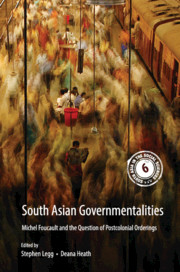1 - Introducing South Asian Governmentalities
from Introductions
Published online by Cambridge University Press: 28 October 2018
Summary
I write things which seem usable. In a word, usable in a different way, by different people, in different countries in certain cases. Thus, if I analyse something such as madness or power and that serves some purpose, then that's enough, that's why I write. If someone uses what I write differently then that's not disagreeable to me, and even if he [sic] uses it in another context for something else, then I am quite happy.
(Foucault, 1978 [2013], 111)In his now classic lecture at the Collège de France on 1 February 1978, Foucault examined governmentality as a type of power, discussed the preeminence of governmental power over time, and analysed the governmentalisation of the state. He also outlined what he saw as three main types of government, which were related to different registers: that of self-government, which was bound up with morality; that of governing a family, which was a matter of economy; and that of ruling the state, which was a political concern (Foucault, 2007, 94). All of these encompassed what Foucault termed ‘governmentality’. A form of power ascendant in Europe beginning in the sixteenth century – though with much older antecedents – governmentality emerged in apparatuses that combined sovereign, disciplinary and governmental power, each of which in isolation had their own ends: for sovereignty, submission to the law; for discipline, to normalise the behaviour of individuals; and for government to employ tactics that alter individual behaviour in order to manage populations (Foucault, 2007, 98–99).
While there has been a tendency among Foucauldian scholars to examine each of these forms of power in isolation, as Foucault made clear in his Security, Territory, Population lecture series (2007), it was instead possible to ‘speak of a sovereign governmentality, a disciplinary governmentality or equally a governmentality that was dominated by the new dispositif of power with which that year's lectures were concerned, security’ (Brown, 2014, 7–8). Enacted through institutions (such as the family or school), discourses (such as medicine or criminal justice) and procedures and analyses (such as surveys and statistics), the aim of governmentality is to maintain a healthy and productive population.
- Type
- Chapter
- Information
- South Asian GovernmentalitiesMichel Foucault and the Question of Postcolonial Orderings, pp. 1 - 36Publisher: Cambridge University PressPrint publication year: 2018
- 2
- Cited by



